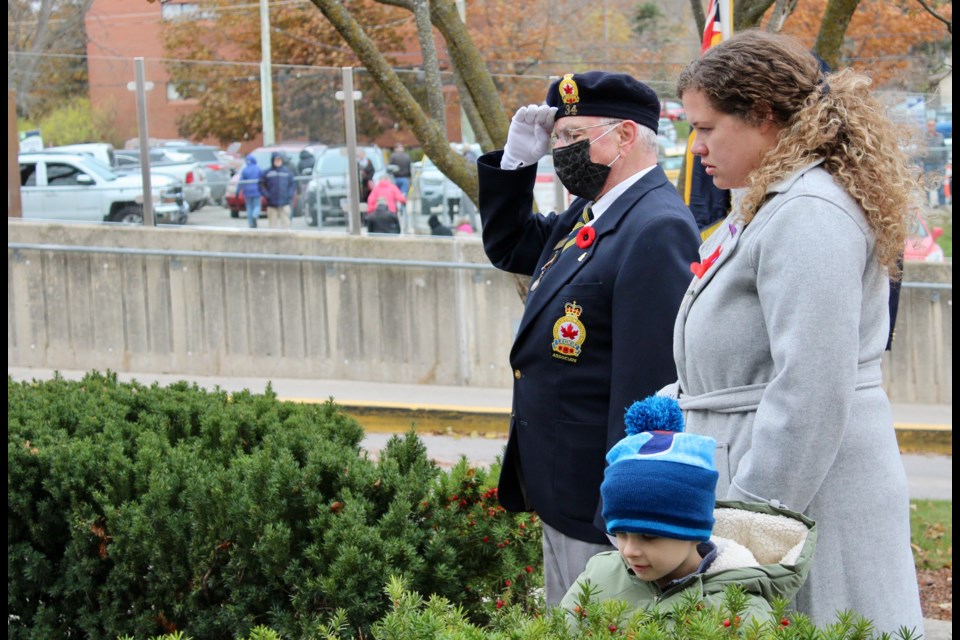As the crowd gathered Thursday in Orillia to mark Remembrance Day, the fragile state of affairs in Afghanistan, past and present, loomed large.
“Like you, I have been watching the headlines of what’s going on in Afghanistan now that Canadians, Americans, the allies who went there over 20 years ago, have left,” said Rev. Terry Bennett.
“I have read about the terrible trial to get women’s education back online under the Taliban. It has not been easy. Six women who stood up for the rights of women in their country have been executed.”
The situation in Afghanistan over the years is one that is close to Bennett’s family. When his daughter was five years old, she had a friend named Nichola Goddard.
Goddard went on to attend the Royal Military College before joining the Canadian Armed Forces and rising through the ranks to become a captain.
In May 2006, a few months after being deployed to Afghanistan, she was killed in combat.
“Today, the Silver Cross Mothers here and in Ottawa are remembering those who died in Afghanistan,” Bennett said.
The Silver Cross is given each year to mothers or widows of Canadian soldiers who have died while on duty.
At Thursday’s ceremony in Orillia, Jennine Collier carried that honour on behalf of her mother, Carol.
Collier’s brother, Sapper Brian Collier, of Bradford, was killed in 2010 by an improvised explosive device while on duty in Afghanistan. He was 24.
“It was a big honour to lay the Silver Cross wreath on behalf of my mom,” said Jennine Collier, who recently moved to Orillia. “It was really humbling. We’ve gone to other (ceremonies) on Remembrance Day and this is the biggest I’ve ever seen. It was quite remarkable seeing how many people were actually here.”
It’s heartening to see that type of support for people like her brother, a man she remembers as being “always a protector.”
Whether it was a friend, family member or hockey teammate, “he liked to protect people,” Collier said.
That included his three younger sisters.
“It was hard having boyfriends,” Collier said with a laugh.
The Colliers aren’t what would be typically referred to as a military family. So, it came as a bit of a shock when Brian enlisted.
“He surprised us. He came home one day and said he enrolled in the military and he wanted to go find Osama bin Laden and he wanted to make sure that little girls could go to school,” his sister recalled.
That’s why Bennett’s words resonated with her during the ceremony.
The reverend noted the effort in Afghanistan was one of many to which Canadians have contributed.
“It was a terrible sacrifice,” he said of those who died in Afghanistan, “but then again, there is a cost to human freedom. We don’t know that often because we’ve enjoyed it for so long, but what’s happening now in that country reminds us of the stark decision that was made in 1940, when France and Britain had lost a war — the blitzkrieg in France — and (British prime minister Winston) Churchill was having to decide to continue or to make peace at a price.”
In June 1940, the 1st Canadian Division arrived across the pond to help defend the British Isles.
Canada left its mark on military history, Bennett said, pointing out it was a Canadian — Lt.-Col. John McCrae — who wrote In Flanders Fields and launched the poppy as a national symbol that was adopted as such 100 years ago.
“It is Canadians who stepped up to the challenge — a nation of less than 12 million people — and put 1.1 million Canadians in uniform,” Bennett said. “We owe them a great deal, but mostly the right to have freedom. That has now been lost in Afghanistan.”
The fight for peace is just that — a fight — and it comes with a cost.
“That price will be paid by those who stand up and by those who make their voice counted for human freedom and human dignity. We can only mourn for the women in Afghanistan today and what they are facing,” Bennett said.
The cost of freedom should not be lost on Canadians, he added, despite the privileges they enjoy today.
“Lest we ever forget that somehow freedom has a price tag and you and I are so fortunate to live in this country, where we are free to worship as we choose, to speak as we choose, to vote for whomever we choose, to be people who stand up proudly and say Canada has defended the rights of humanity and asked for nothing in return, only the dignity of all humanity,” he said, “and today we stand proudly as Canadians, willing to remember. Lest we ever forget. Lest we ever forget.”
